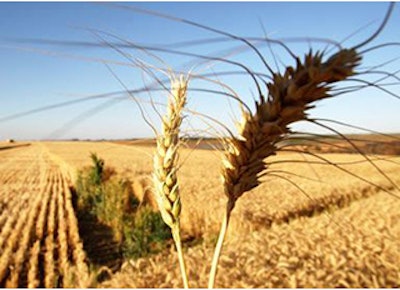
WICHITA, Kan. (AP) — Spring heat poses a greater danger to winter wheat crops than early freezes in the fall, according to a new Kansas State University study that highlights the need to develop more heat-tolerant varieties as climate change increases global temperatures.
Researchers examined results from 11 Kansas State University experimental field trial locations and matched that data, spanning from 1985 through 2013, with weather information at those sites.
"There is a lot of evidence accumulating that suggests that global temperatures are likely to increase in the future, and we were interested in what the impact of that potential future warming would be on wheat production," said agricultural economist Andrew Barkley, one of the study's authors.
The research found that a one-degree increase in heat in the spring would decrease yields by about 7 percent, though damage from hotter temperatures can be partially offset with more precipitation.
"It would be economically significant, obviously, since in Kansas our wheat crop has a value of nearly $3 billion a year and it represents 15 percent of tall the wheat grown in the United States. So it would be a large economic cost," Barkley said. "However, we do expect new wheat varieties to be more heat resistant in the future. And that is the take-home message of this research."
Wheat breeders are already working to develop heat-resistant varieties and should be able to "stay in front" of a warming trend, he added. Barkley noted that between 1985 and 2013, advancements in wheat breeding have helped improve wheat yields by 27 percent.
This latest research, which is being published in the Proceedings of the National Academy of Sciences, agrees with a finding earlier this year that heat hurts wheat crops.
In that study, researchers at Kansas State and elsewhere conducted field experiments around the world and concluded the effects from climate change and its higher temperatures are more will be more severe than expected and is happening sooner than anticipated. It contended at least one-quarter of the world's wheat would be lost to extreme weather if nothing is done to change the trajectory.






















